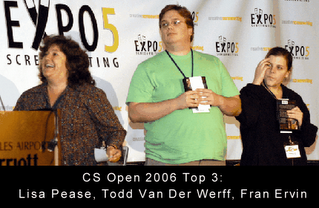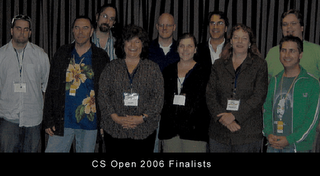
by Jim Cirile
Time to go behind the scenes with InkTip, one of my favorite screenwriting websites. I’ve used InkTip for years, and I am always surprised when I talk to writers who don’t know about yet. For 50 bucks, inktip.com allows you to post a logline, treatment, synopsis and script online, where their huge database of producers, managers, etc., can browse them at their leisure. I have found that it is a great way to keep my ‘back catalog’ out there for the industry to find.
And while InkTip has plenty of big name companies on board, for my money, InkTip is also the best place to find what I call ‘below the radar’ producers--guys who are real but don’t have a studio deal; thus they are not being serviced by agencies and have no real way to find material other than word of mouth. Those are the guys you really want to target, since they are generally hungry, they read, and break new talent constantly, unlike the big prodcos who could care less about you unless you’re repped by a 3-letter agency.
Maia Peters gives us the lowdown on all things InkTip.
++++++++++++++++++++++++++++++++++++
Jim Cirile: What was the genesis of inktip.com?
Maia Peters: Jerrol (LeBaron, InkTip founder) wrote a script and noticed how hard it was to get it read by anybody.
JC: Oh, he’s a writer himself?
MP: Not anymore.
JC: He wised up.
MP: (laughs) His drive has been to help the screenwriter get exposure. It started as Writers Script Network. I started here almost as soon as Jerrol opened the business (in 2000) and was the only employee for a number of years. We’ve been growing ever since. I’d come from a commercial production company, and I started here as data entry just doing the very tedious tasks. At the time, our website was, shall we say, a bit lacking (laughs), so most of the questions that we got from writers were about tech support, so I spent a lot of the day answering those types of questions. Over the years, the site has become more and more user-friendly. Now the questions are more about how we can help (writers) use the site to the best of their ability.
JC: When I first heard about InkTip way back when, I thought it was a great idea, and I posted some stuff. The price was right, and I got a couple of bites from below the radar” producers, which was awesome. It struck me—just how do those guys find scripts? Inktip seems to be a great way to reach those types of companies. How did you guys go about making these folks aware of InkTip?
MP: All the credit for that goes to Jerrol. It started with a survey to agents and managers and producers, directors to find out what they would need in a service like inktip. And then as the service has grown, we’ve cold-called people from the Hollywood Creative Directory, and word has really spread by word of mouth. We talk to the producers and find out what they’re looking for and get them to go to the site.
JC: Obviously your database of producers and industry types has grown as years have gone by. Would you say InkTip is a well-known resource to the industry?
MP: Most definitely. We’ve had 48 films produced off scripts placed on InkTip since 2003. If you go to the site, you’ll see a comprehensive list of all the InkTip deals. We are averaging three scripts set up, sold or optioned a week! This week we have Eva Mendes’ company looking for a script for her. Next week it could be somebody you’ve never heard of, but we’ve checked up on them, and they have the ability to get a feature film produced. It really ranges all over the board.
JC: So you guys do due diligence for any producer who tries to get on the list?
MP: Every single producer or agent to whom we give access, we do a due diligence.
JC: So my dog couldn’t just call up and say, “Rerro, R’I’d rike roo roption a ript?”
MP: (laughs) Absolutely not. Jerrol coming from the writer’s perspective, he wanted to be sure that security was at the forefront. It’s about (the prodco’s) contacts, their credits, their history. They have to have done something.
JC: Or if they’re junior, maybe they’re coming from a known company but have just gone out on their own, but people know who they are?
MP: Exactly. This happens rarely, but we have sometimes we get somebody who is independently funded and just needs a script for this one time.
JC: That’s a good point. What if it’s some guy out in Boise who has nothing to do with the movie business, but he’s got money? I wrote a script for a guy who was a fried chicken magnate from the east coast, who wanted in to the biz. It was a nice payday. But this guy had no ‘legitimacy.’ How would a guy like that get access?
MP: It totally depends on the individual. It’s a case-by-case basis. Often it’s a matter of if we were writers, would we want these people to have access to our script?
JC: Obviously you guys have had a lot of successes.
MP: We average three scripts optioned, or writers hired, every week. Since 2002 we have had over 400 scripts optioned, and over 200 writers gained representation.
JC: And you don’t take any commission or anything, right?
MP: Oh, no. Once the producer gets in touch with the writer, we are out of the loop.
JC: You also publish a preferred newsletter that contains companies looking for specific types of material. Is that getting a lot of play?
MP: We haven’t been doing that as long, but last year we have had 38 scripts optioned, I think. I think it has led to more produced films, because the producers are calling for a specific type of script. We’re just putting out a call to writers who have that type of script on their shelf that might qualify for the lead.
JC: What do you see in the future for InkTip?
MP: Our next big launch is inktippro.com, which is a site for industry professionals for networking, more than searching for scripts. It is only accessible to industry professionals. Mostly people who have qualified for Inktip will qualify for Inktip Pro. It’s a tool where they can put mandates out like, “We’re looking for a partially financed documentary that we can distribute,” for example. And if another producer on Inktip Pro sees that, and they have it, they can get in touch with them.
Otherwise, we just want to keep getting more and more features produced. We had 20 features produced last year. Granted some of them were for TV, or direct to DVD--
JC: Nothing wrong with that.
MP: Exactly. And we already have 20 slated for this year, so hopefully, knock on wood, those will all go through.
JC: Whenever I get your newsletter, I notice a specific type of script people tend to be looking for. Anybody who reads my column for Creative Screenwriting knows there are certain genres that are hotter than others at any given time.
MP: That is the main point—at any given time. It depends on what movie that last came out and was most popular.
JC: Of course, and what can be produced on a dime. I think it’s fair to say if you’re a young horror writer, and you’ve got a horror spec, and you get it uyp on Inktip, it will probably get some play, as opposed to your Elizabethan romantic drama.
MP: (laughs) Although there is a Civil War-era movie with a $60 million budget that is being produced from an Inktip script.
JC: That’s cool. I guess there’s a producer for every niche.
MP: But I think Jerrol would say that the genres that are most searched are thriller, horror and comedy.
JC: Any advice for folks who are maybe using Inktip now and are not getting the play that they want, or for potential future Inktip users?
MP: The logline is so important. It’s the first impression they’re gonna get, and if it’s too long, too convoluted, the producer is just going to skip past your listing without going further to read your synopsis or your script. We have lots of tips on loglines and synopses on the site (as do we: go here to read our article, Does Your Logline Rock? http://coverageink.blogspot.com/2006_03_01_archive.html).
The other advice would be to always be marketing your work. If you don’t get it out there, it won’t get made.
JC: Thanks, Maia! Check out InkTip at www.inktip.com.
 Hey, Stormies!
Hey, Stormies!





























